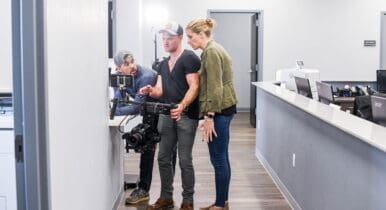What Will the Post-Election Political Job Market Look Like?
The Washington, DC job market is faring better than most during the pandemic-induced downturn — for reasons not entirely political. But politics are the reason why the Beltway jobs numbers could get even stronger after Nov. 3 when there’s going to be a massive staff turnover from top to bottom.
The Washington, DC job market is faring better than most during the pandemic-induced downturn — for reasons not entirely political. But politics are the reason why the Beltway jobs numbers could get even stronger after Nov. 3. Whether President Trump retains the White House, or Joe Biden wins, there’s going to be a massive staff turnover from top to bottom.
A similar spin of the revolving door is expected on Capitol Hill, where some longtime senators could be out. But job seekers coming from outside the Beltway face a dilemma: move to the District when most work is still remote or wait for an offer to come.
Chris Jones, founder of PoliTemps, a Democratic staffing agency that works with firms, elected officials, and groups, recommends those aiming for the Beltway to brush up on their technical skills, and master tools like Zoom and G Suite. Most of all, they need to get to DC immediately after the election. “You don’t want to be the last person who arrives,” he said, noting that networking will look slightly different.
“They’re not going to be able to network as strongly in person as they used to,” said Jones. “People are having [socially distanced] lunches and dinners. They’re meeting and they’re talking and they’re going for runs. Rubbing elbows is going to be harder to do. It’s going to be touching elbows.”
Jones estimates that at least 3,000 campaign staff will be unemployed after Election Day. And he recommended hiring managers be open to remote hires in this environment, but also encourage the talent they’re bringing on to plan to move to DC eventually.
“In three-to-nine months, things are going to change,” he said. “There’s going to be a snapback. Young people especially, they’re going to want to get out of the house. Twenty-year-olds want to get to an office, they want to interact, they want to talk.”
In fact, as much as Jones appreciates the desire not to be stuck inside a DC English-basement apartment with a weird roommate and a cat during the pandemic, he’s not all-in on remote work.
“I would lean, personally, to a local hire,” he said. “I’m a big fan of in-person networking and relationship building.”
His best advice for political consulting firms is that they should “hire cautiously until they get some signals” about their business, and think through “human capital issues” like office structures before making the leap. He also advocated against the post-election staff cull that many firms do because, at least on the left, there’s the potential to get involved in major policy pushes: “I would recommend keeping good staff close, on the payroll.”

